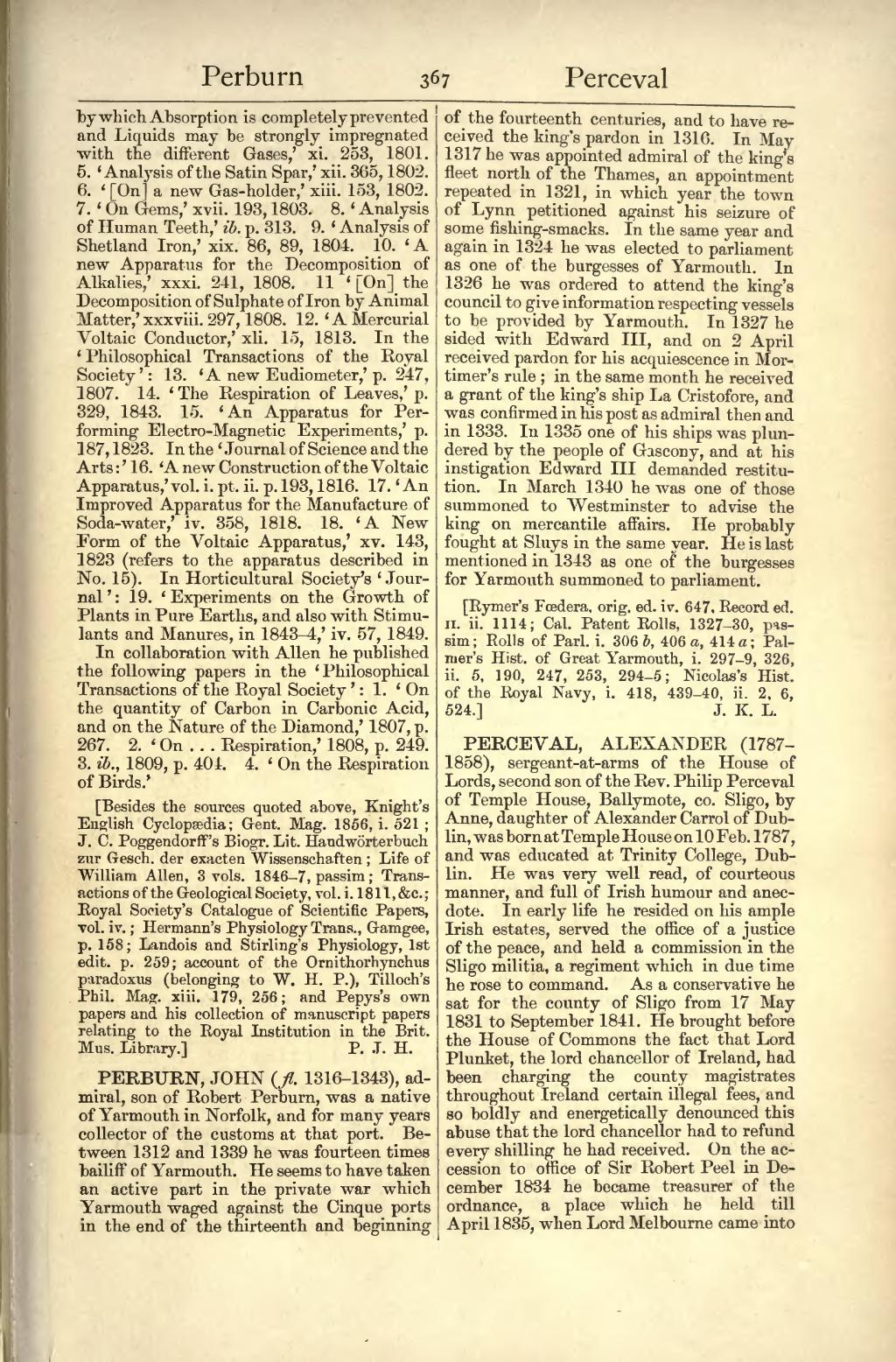- ‘Analysis of the Satin Spar,’ xii. 365, 1802.
- ‘[On] a new Gas-holder,’ xiii. 153, 1802.
- ‘On Gems,’ xvii. 193, 1803.
- ‘Analysis of Human Teeth,’ ib. p. 313.
- ‘Analysis of Shetland Iron,’ xix. 86, 89, 1804.
- ‘A new Apparatus for the Decomposition of Alkalies,’ xxxi. 241, 1808.
- ‘[On] the Decomposition of Sulphate of Iron by Animal Matter,’ xxxviii. 297, 1808.
- ‘A Mercurial Voltaic Conductor,’ xli. 15, 1813.
by which Absorption is completely prevented and Liquids may be strongly impregnated with the different Gases,’ xi. 253, 1801.
In the ‘Philosophical Transactions of the Royal Society’:
- ‘A new Eudiometer,’ p. 247, 1807.
- ‘The Respiration of Leaves,’ p. 329, 1843.
- ‘An Apparatus for Performing Electro-Magnetic Experiments,’ p. 187, 1823. In the ‘Journal of Science and the Arts:’
- ‘A new Construction of the Voltaic Apparatus,’ vol. i. pt. ii. p. 193, 1816.
- ‘An Improved Apparatus for the Manufacture of Soda-water,’ iv. 358, 1818.
- ‘A New Form of the Voltaic Apparatus,’ xv. 143, 1823 (refers to the apparatus described in No. 15).
In Horticultural Society's ‘Journal’:
- ‘Experiments on the Growth of Plants in Pure Earths, and also with Stimulants and Manures, in 1843–4,’ iv. 57, 1849.
In collaboration with Allen he published the following papers in the ‘Philosophical Transactions of the Royal Society’:
- ‘On the quantity of Carbon in Carbonic Acid, and on the Nature of the Diamond,’ 1807, p. 267.
- ‘On … Respiration,’ 1808, p. 249.
- ib., 1809, p. 404.
- ‘On the Respiration of Birds.’
[Besides the sources quoted above, Knight's English Cyclopædia; Gent. Mag. 1856, i. 521; J. C. Poggendorff's Biogr. Lit. Handwörterbuch zur Gesch. der exacten Wissenschaften; Life of William Allen, 3 vols. 1846–7, passim; Transactions of the Geological Society, vol. i. 1811, &c.; Royal Society's Catalogue of Scientific Papers, vol. iv.; Hermann's Physiology Trans., Gamgee, p. 158; Landois and Stirling's Physiology, 1st edit. p. 259; account of the Ornithorhynchus paradoxus (belonging to W. H. P.), Tilloch's Phil. Mag. xiii. 179, 256; and Pepys's own papers and his collection of manuscript papers relating to the Royal Institution in the Brit. Mus. Library.]
PERBURN, JOHN (fl. 1316–1343), admiral, son of Robert Perburn, was a native of Yarmouth in Norfolk, and for many years collector of the customs at that port. Between 1312 and 1339 he was fourteen times bailiff of Yarmouth. He seems to have taken an active part in the private war which Yarmouth waged against the Cinque ports in the end of the thirteenth and beginning of the fourteenth centuries, and to have received the king's pardon in 1316. In May 1317 he was appointed admiral of the king's fleet north of the Thames, an appointment repeated in 1321, in which year the town of Lynn petitioned against his seizure of some fishing-smacks. In the same year and again in 1324 he was elected to parliament as one of the burgesses of Yarmouth. In 1326 he was ordered to attend the king's council to give information respecting vessels to be provided by Yarmouth. In 1327 he sided with Edward III, and on 2 April received pardon for his acquiescence in Mortimer's rule; in the same month he received a grant of the king's ship La Cristofore, and was confirmed in his post as admiral then and in 1333. In 1335 one of his ships was plundered by the people of Gascony, and at his instigation Edward III demanded restitution. In March 1340 he was one of those summoned to Westminster to advise the king on mercantile affairs. He probably fought at Sluys in the same year. He is last mentioned in 1343 as one of the burgesses for Yarmouth summoned to parliament.
[Rymer's Fœdera, orig. ed. iv. 647, Record ed. II. ii. 1114; Cal. Patent Rolls, 1327–30, passim; Rolls of Parl. i. 306 b, 406 a, 414 a; Palmer's Hist. of Great Yarmouth, i. 297–9, 326, ii. 5, 190, 247, 253, 294–5; Nicolas's Hist. of the Royal Navy, i. 418, 439–40, ii. 2, 6, 524.]
PERCEVAL, ALEXANDER (1787–1858), sergeant-at-arms of the House of Lords, second son of the Rev. Philip Perceval of Temple House, Ballymote, co. Sligo, by Anne, daughter of Alexander Carrol of Dublin, was born at Temple House on 10 Feb. 1787, and was educated at Trinity College, Dublin. He was very well read, of courteous manner, and full of Irish humour and anecdote. In early life he resided on his ample Irish estates, served the office of a justice of the peace, and held a commission in the Sligo militia, a regiment which in due time he rose to command. As a conservative he sat for the county of Sligo from 17 May 1831 to September 1841. He brought before the House of Commons the fact that Lord Plunket, the lord chancellor of Ireland, had been charging the county magistrates throughout Ireland certain illegal fees, and so boldly and energetically denounced this abuse that the lord chancellor had to refund every shilling he had received. On the accession to office of Sir Robert Peel in December 1834 he became treasurer of the ordnance, a place which he held till April 1835, when Lord Melbourne came into
